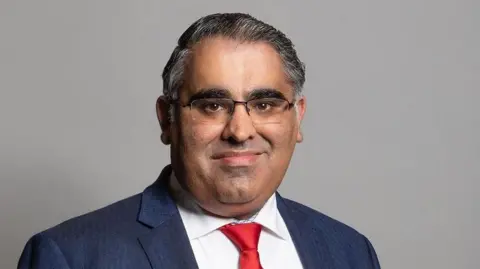On May 13, 2025, Labour MP Tahir Ali is under scrutiny due to an investigation launched by the Independent Parliamentary Standards Authority (Ipsa). This inquiry specifically focuses on his expenses concerning office costs, travel, and accommodation. The issue at stake revolves around whether Ali adhered to the strict guidelines set forth by Ipsa regarding the financial and operational conduct of MPs.
Tahir Ali, representing the Birmingham Hall Green and Moseley constituency, is being investigated for potential infractions involving the reimbursement claims he submitted. The Ipsa’s compliance office, which is responsible for overseeing MPs’ financial conduct, is conducting this probe. They evaluate complaints about the use of the budget that MPs are allocated for various operational expenses. The compliance office emphasized that no additional details would be made available until the investigation is fully complete.
In reaction to the ongoing inquiry, Ali has expressed confidence in his compliance with Ipsa’s regulations, stating that he is committed to cooperating with the investigation. He maintains that he has adhered to the necessary rules and is prepared to provide any required information to support the process. This assurance is important as it reflects an understanding of the serious implications that the investigation could hold not only for his reputation but also for the integrity of the parliamentary system.
The focus of the investigation sheds light on the broader implications concerning how MPs utilize public funds. Ipsa’s governing framework allows MPs, like Ali, to claim expenses for necessary functions related to their parliamentary duties, including the operation of their offices, salaries for their staff, and essential travel accommodations. However, claims must align with a clear set of guidelines and ethical considerations.
The guidelines outlined by Ipsa are designed to ensure transparency and accountability within the ranks of parliamentary representatives. MPs are required to submit their claims in accordance with predetermined criteria, thereby obligating them to follow regulations that are meant to discourage misuse of public resources. A violation of these regulations could lead to serious consequences, including sanctions or demands for repayment of misclaimed funds.
The situation surrounding Tahir Ali’s investigation reflects ongoing concerns regarding the management of public funds by elected officials. Previous issues concerning MPs’ expenses have led to significant political scrutiny and have fueled debates about financial accountability in Parliament. As the investigation unfolds, it presents an important case study on the delicate balance between public service and personal financial management within government.
In summary, Tahir Ali’s current predicament serves as a reminder that MPs must operate with integrity and diligence concerning their financial responsibilities. The ongoing investigation by Ipsa could potentially reshape perceptions of their roles and responsibilities, as accountability measures continue to evolve within the political landscape. The outcome of this probe would not only impact Ali but might also resonate broadly across Parliament, shaping future policies on expense claims and the ethical conduct expected from MPs. As the public awaits the conclusion of this investigation, the narrative of political accountability and transparency remains at the forefront of national discourse.



